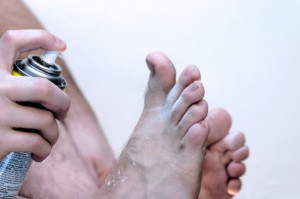


 Athlete’s foot is a fungal infection that affects the skin of the feet, mainly in between the toes. The infection usually causes a rash that becomes red, itchy, scaly, and dry. Other signs of athlete’s foot can include a foul odor, cracked skin, peeling of the skin, and a burning sensation. While anyone can get athlete’s foot, the fungus that causes athlete’s foot is usually spread in warm and moist environments such as communal showers or public pools. Athlete’s foot can also spread from sharing items that touch the feet. Patients who believe they have developed this condition should visit a podiatrist for a professional diagnosis and treatment plan.
Athlete’s foot is a fungal infection that affects the skin of the feet, mainly in between the toes. The infection usually causes a rash that becomes red, itchy, scaly, and dry. Other signs of athlete’s foot can include a foul odor, cracked skin, peeling of the skin, and a burning sensation. While anyone can get athlete’s foot, the fungus that causes athlete’s foot is usually spread in warm and moist environments such as communal showers or public pools. Athlete’s foot can also spread from sharing items that touch the feet. Patients who believe they have developed this condition should visit a podiatrist for a professional diagnosis and treatment plan.
Athlete’s Foot
Athlete’s foot is often an uncomfortable condition to experience. Thankfully, podiatrists specialize in treating athlete’s foot and offer the best treatment options. If you have any questions about athlete’s foot, consult with our podiatrist from Dr. Powers Foot and Ankle. Our doctor will assess your condition and provide you with quality treatment.
What Is Athlete’s Foot?
Tinea pedis, more commonly known as athlete’s foot, is a non-serious and common fungal infection of the foot. Athlete’s foot is contagious and can be contracted by touching someone who has it or infected surfaces. The most common places contaminated by it are public showers, locker rooms, and swimming pools. Once contracted, it grows on feet that are left inside moist, dark, and warm shoes and socks.
Prevention
The most effective ways to prevent athlete’s foot include:
Symptoms
Athlete’s foot initially occurs as a rash between the toes. However, if left undiagnosed, it can spread to the sides and bottom of the feet, toenails, and if touched by hand, the hands themselves. Symptoms include:
Diagnosis and Treatment
Diagnosis is quick and easy. Skin samples will be taken and either viewed under a microscope or sent to a lab for testing. Sometimes, a podiatrist can diagnose it based on simply looking at it. Once confirmed, treatment options include oral and topical antifungal medications.
If you have any questions, please feel free to contact one of our offices located in Bloomington, Bedford, and Washington, IN . We offer the newest diagnostic and treatment technologies for all your foot care needs.